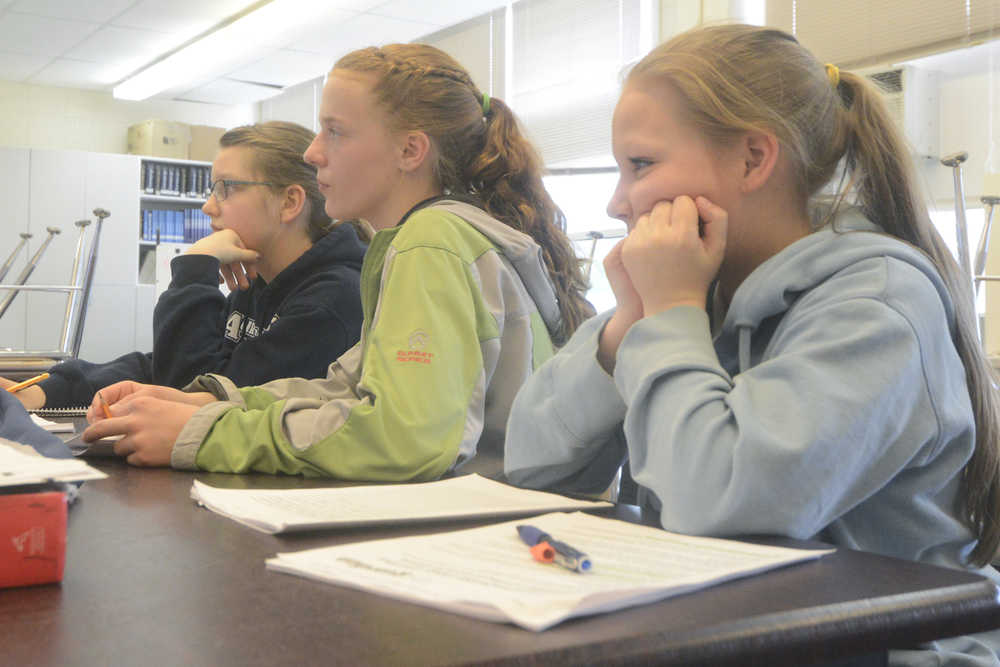While some students worry about math tests or an upcoming sporting competition, a handful at Aurora Borealis Charter School and Kenai Central High School are puzzling over some of the most vexing current global issues.
The kids belong to teams coached by Julie Ball, a teacher at Aurora Borealis who handles the curriculum there that implements Future Problem Solving Program International, a program started in 1974 to help students develop critical and creative thinking and to get them thinking about the future. What was once an after-school program has been implemented as curriculum for fifth- through eighth-grade students at Aurora Borealis for the last three years, Ball said.
“Due to the new Alaska state standards, we were trying to implement more of the Language Arts curriculum and this was one way to meet some of those standards,” she said.
This year, a sixth-grade team from Aurora Borealis and a ninth-grade team from Kenai Central High School, where the program material is not mandatory curriculum, will travel to the program’s 2016 International Conference June 1-5 at Michigan State University in East Lansing, Michigan.
All fifth- through eighth-graders at Aurora Borealis must complete the state-qualifying problem, Ball said. From there, a few teams advance to the state level and only three from the entire state go on to the international conference. The only age group Ball is not bringing to the competition is the “adult” category for students in grades 10-12.
Both teams will compete in a category called Global Issues Problem Solving, where groups of four are given a “future scene” and two hours to use a six-step creative problem solving process to write an action plan down in a packet. They have no idea what the future scene, or problem, is before the competition. During a Tuesday practice session, members from both teams went over the pros and cons for solar energy, transmission lines and potential, untapped energy sources.
Kenai Central team members Dominik Efta, Nimi Pollock and Vitalia Strait said preparing for the competition is all about studying and building up research and vocabulary. The students have also been fundraising to help pay for the trip.
“Anything pertaining to renewable energy, even if it’s not specifically in the future scene, a lot of times we can still use it in solutions,” Pollock said.
“Because then it shows research, and you get extra points for that,” Strait added.
The Kenai Central team made it to the international competition last year as well, but had four team members at the time. This year, their fourth member will not be able to attend the conference.
“These three are going to have to do what a team normally does with four people,” Ball said.
More than 2,000 people will attend this year, Ball said. The members said they will just have to focus more to get the job done.
“We work pretty well as a team,” Pollock said. “I mean we’ve had this team since, like, seventh grade.”
The Aurora Borealis team, made up of members Shelbie Naylor, Bailey Epperheimer, Melita Efta and Chloee Swanson, is both nervous and excited to attend the conference in Michigan. The team took first at the state level for both its action plan packet and the presentation teams are required to do. The presentation scores do not affect whether a team’s packet will advance, Ball said.
“It’s not only being able to write, it’s being able to present yourself in public,” she said.
Members of the sixth-grade team have enjoyed learning about innovative technologies and working together.
“When someone gives me a problem, I feel like it’s (more fun) to work as a team to try and solve the problem,” Epperheimer said. “It excites me, kind of, to work as a team.”
The packet-writing potion of the competition can pose some challenges, the students said.
“Trying to get the research and vocabulary into your packet is kind of rough,” Pollock said. “You have ideas but you’re like, ‘How can I incorporate this?’”
“Or even just wording the idea, because there’s limited space,” Strait added.
Proper spelling isn’t the main thing students need to focus on, Ball said, but evaluators need to be able to understand the ideas in the action plan.
“It really teaches good technical writing, because you need to be precise,” she said
Since the program was implemented into the Aurora Borealis curriculum, Ball said she has noticed a difference in the students she’s been teaching.
“When I first started coaching it throughout the entire school, there were a lot of kids that were going, ‘This is too hard,’” she said.
Ball described one student who went home and told his parents that he no longer liked her class. His parents were confused because the student usually loved her teaching, she said.
“And he said, ‘Because she makes us think too much,’” Ball said. “And now that same student loves future problem solving. So it is an intense level of thinking and it’s a hard level of reading.”
Reach Megan Pacer at megan.pacer@peninsulaclarion.com.

